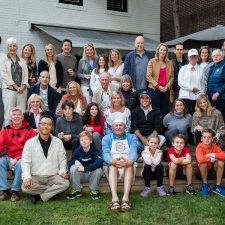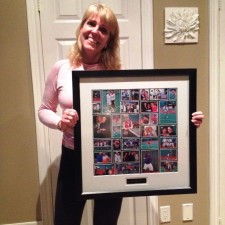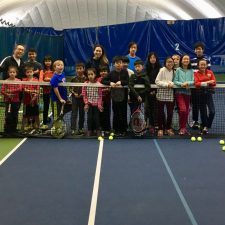
Article written by Prisha Patel
Part of the 30 Years of Possible series in celebration of Philpott Children’s Tennis 30th Anniversary.
Stephan Harris’ natural desire to help people plus his infectious personality and beaming smile, have made him one of the most popular Philpott coaches; not only with the kids but with the other coaches as well.
He has been involved with Philpott Children’s Tennis since 2015, and recently celebrated his graduation from York University where he completed a degree in psychology.
We sat down recently with Stephan to learn more about his journey with Philpott and what comes next for him post-graduation.
1. How did you get involved with Philpott Children’s Tennis?
I was in my final year of high school and there was an announcement at school that Philpott was looking for volunteers. I had played tennis and had some coaching experience with my dad, so I decided to volunteer. Halfway through my volunteer term, I was offered a spot in the Leadership program and a job as an assistant coach. Since that summer in 2015, I have always worked with Philpott, growing into bigger roles along the way. It’s pretty awesome that I started through a school announcement, and now I’ve had a career with Philpott!
2. You’ve coached tennis at various places but you have always stayed involved with Philpott. What draws you to the Philpott program in particular?
Tennis for me has always been behind a paywall; access to courts and tennis lessons cost money. Because Philpott’s programs are free, I really understood what we were doing for kids in terms of making the sport accessible and welcoming, and so I have always enjoyed coaching at Philpott even more.
3. You have held a number of different positions with Philpott. Can you describe how you grew from a Volunteer position to take on Coaching roles and now onto Site Supervisor?
I started as a curious volunteer, became an assistant coach (not certified), and at the same time, trained in the Leadership program to pass my coaching certification. Once certified, I became a Head Coach leading one of the summer camp sites. There, I really developed responsibility and leadership skills, because I was maintaining a schedule all by myself and creating lessons plans. These skills allowed me to take on bigger roles with Philpott. In time, I was able to run the leadership course for others and become a Site Supervisor overseeing all of our East end locations.
Every step of the way, I took on roles that added more responsibility, and that resulted in more development and growth. For me, it’s been a life-changing opportunity, to go from a volunteer position, to a summer job, to an entire career at Philpott!
4. What have you learned about yourself through your experiences with Philpott?
Coaching-wise, I was always really good at helping people; and with my tennis background, helping people at tennis came naturally. But in all my roles with Philpott, I learned more and more that I can handle bigger responsibilities.
I have learned how to handle all sorts of life situations; how to become adaptable; and developed my problem-solving skills. All of these skills have gotten stronger since they are tested daily through the job.
I guess I’ve mostly learned that what might seem unattainable isn’t that far out of reach; you just need to have a plan, focus, and reach ahead, like Richard always tells me.
5. Now that you have graduated, what’s next in your Philpott journey?
I definitely want to continue helping Philpott grow. I want to continue running programs as best I can. In my new role as Head Coach for San Romanoway, I’ll be overseeing projects, running programs, handling payroll, and building the future for Philpott with an all-season facility like everyone’s been wanting.
But I also hope to combine my tennis and coaching skills with my degree in psychology. I want to make sure we are creating the best possible environment at our Philpott programs where everyone feels comfortable and welcome. It’s so important for kids to develop healthy attitudes towards physical activity, mental health, and helping others. On the tennis courts, I often meet new immigrants and people from different countries, and it isn’t always easy for them. I always make an effort to talk to them and listen. If they are carrying burdens, it sometimes helps to let it out, and this allows them to improve at tennis on-court.




